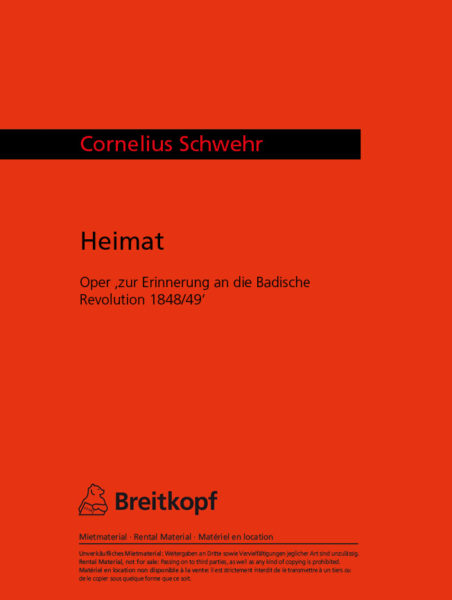Cornelius Schwehr (*1953) Heimat
Oper in 2 Akten 'zur Erinnerung an die Badische Revolution 1848/49' Dauer: 90' Text: Walter Mossmann
Soli: SMezTBarB – Chor: SSATBB – 2(Picc).2(Eh).2(B-Klar).2(Kfg). – 4.2.2.1.- Schl(2) – Hfe.Git – Str.: 8.8.6.4.3. Bühnenmusik: Klar.Schl.Klav.Vl
Uraufführung: Freiburg, 29. Mai 1999
Ort und Zeit: Studierstube des Hikel, Kasernenhof, vor der Bäckerei, Straße, Dachstube, Bahnhof, vor dem Palast "Charivari”, freies Feld, Gebirge, Salon in Straßburg, 1848/49 und in der Gegenwart
Personen: Sofie (Sopran) - Amalie (Mezzosopran) - Max (Tenor) - Der Alte (Bariton) - Hikel (Bass) - Mutter* (Sopran) - Vater* (Tenor) - Der Kipperer* (Bariton) - 3 Frauen* (Sopran, Mezzosopran, Alt) - 2 Gesellen* (Tenöre) - Der Junge* (Sprechrolle) - de Mill* (Bariton) - 3 Herren* (Tenor, Bariton, Bass) - 3 Masken* (Sopran, Alt, Tenor) - 2 Männer* (Bariton, Bass) (* Nebenrollen, die aus dem Chor besetzt werden können)
Personen für die Zwischenspiele: 3 Schauspielerinnen, 1 Schauspieler, 1 männliche Nebenrolle
Die Oper entwickelt die Geschichte von vier Personen, die aus unterschiedlichen Gründen und aus denkbar verschiedenen Ausgangslagen (Student, Offizier, Dienstmädchen, Salondame) in die Auseinandersetzungen in Baden 1849 hineingeraten. Ihr gemeinsames Scheitern – deutsche Revolutionen kennen leider nichts anderes – aus unterschiedlichen Gründen und mit sehr verschiedenen Konsequenzen (Exil, Hinrichtung, Kerkerhaft, vorteilhafte Heirat) bildet den Kern der Erzählung.
Die Opernhandlung ist gebrochen. Sie erscheint als Erinnerung eines der Protagonisten (des exilierten Studenten), der nun, gegen Ende seines Lebens, dieses zusammenfasst, aber das Resümee verwirft. Die Oper ist der Text dieses Alten: er singt sie sich vor, sie ist sein innerer Monolog. Sinnfällig wird das an den Stellen, an denen er Teile des Operngeschehens – Textfetzen, melodische Fragmente, rhythmische Verläufe – verdoppelt, mitsingt, mitspricht: synchron und zeitversetzt. Ihn berührt nichts mehr sonst.
Das Schauspiel: Der alte Mann erhält Besuch an seinem Krankenlager. Die Besucher kennen ihn aus besseren Zeiten. Sie unterhalten sich miteinander über seinen Zustand (an dem sie allerdings nur ein sehr oberflächliches Interesse haben) und bei dieser Gelegenheit über sich selbst, und jeder über den anderen.
Und so wie die Oper, in abstrakter Überhöhung letztendlich das individuelle Schicksal meint und bedeutet, werden die sprechenden Individuen zurück gebogen auf ihre kollektive Bestimmtheit (von der sie selbst allerdings nur sehr wenig zu erahnen scheinen).
Zwei Ebenen, die sich verschränken. Die Oper: Das Allgemeine als Besonderes. Das Schauspiel: Das Besondere als Allgemeines. Der Alte sitzt, nach beiden Seiten hin vermittelt, dazwischen.
Heimat erinnert sich an ihre Gattung, und dieser Erinnerungsgedanke bestimmt die gesamte Anlage. Wie alle Erinnerung im Erinnernden Text und Kontext zugleich ist, so verhalten sich auch hier die beiden grundlegenden Schichten (Oper, Schauspiel) zueinander auf analoge Weise durchlässig: Die Besucher am Krankenlager des Alten sprechen über sich und erinnern sich an den Alten, der Alte (zu keinem Kontakt zu seiner Außenwelt mehr fähig oder willens) erinnert sich an die Revolution – die mittlerweile zur Oper geworden ist.
Diese beschwört auf vielfältige Weise ihre eigene Tradition. So entstehen zum Beispiel unablässig Bühnensituationen, wie sie jedem Operngänger durchaus vertraut sind (Arien, Ensembles, Finali, ein Schwanengesang als Ouvertüre etc.). Allerdings: Beschworen werden diese traditionellen Situationen lediglich als Haltungen, die über Formen sich einstellen und in keinem Falle als Zitate aus dem Fundus der Operngeschichte. Gebrochen werden sie dadurch, dass sie durch ein einziges Bewusstsein (das des Alten, der diese kollektive Erinnerung ausspricht) gefiltert erscheinen.
Traumbilder also, in denen das, was „erzählt“ wird (der „Inhalt“) nur sehr unzulänglich und fadenscheinig mit dem, wie erzählt wird (der „Formung“) zur Deckung kommt. Diese Differenz könnte den Blick auf das öffnen, was sein sollte – wie es auch sein könnte.
(Cornelius Schwehr)









